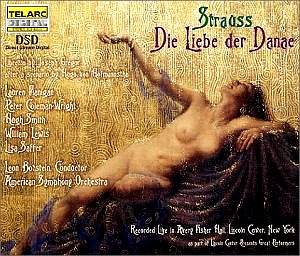Der Liebe der Danae is hardly standard repertory
these days, so a good modern recording comes like a breath of fresh
air. The opera is, in short, delightful. Even the designation given
to it by the composer (‘a lively mythology in three acts’) reflects
this. Despite its subject matter, its world is more fairy-tale than
myth, a scenario which offers Strauss ample opportunities to reveal
the defter side of his compositional persona. This comes across particularly
in the orchestration, often gossamer-light and continuously shifting
in its colours.
The libretto is described as 'by Joseph Gregor, after
a Scenario by Hugo von Hofmannsthal. Der Liebe der Danae was
dedicated to Heinz Tietjen. The late 1930s were historically a dark
era in Germany, and this mythical world would have provided an ideal
escape. The scenario by Hofmannsthal originally dated from just after
Die Frau ohne Schatten (1919), but this was soon forgotten as
Strauss became preoccupied with Intermezzo. It was only in 1938
that he returned to Danae: Joseph Gregor was given the task of
working with Hofmannsthal’s sketch: the result may not have the greatness
of Hofmannsthal's finest work, but perhaps this only steers one's attention
towards Strauss’ glorious music.
The libretto works with two myths: Midas (whose touch
turns everything to gold) and Jupiter's appearance to Danae as golden
rain. Its message seems to centre on the supremacy of human love over
all obstacles: at the end of the opera, the ‘all-powerful’ god Jupiter
is left to ruminate to himself over the beauty of Danae and Midas’ love,
and his own shortcomings. Along with this comes the underlying idea
of the futility of materialism and its eventual subservience to human
love. Just the idealistic tonic to raise Strauss’ spirits, therefore.
The cast in the present recording is not one of superstars:
Peter Coleman-Wright may well be the only name familiar to listeners
this side of the pond, having appeared on discs from Hyperion and Chandos,
among others. Coleman-Wright actually takes on the most demanding role,
that of Jupiter, and is fully equipped with a powerful voice to do so.
His final acceptance of his lot, right at the close of the opera, is
a fitting climax to the plot and Coleman-Wright's interpretation gives
it all the requisite dramatic force. Nevertheless the overall power
of this performance comes less from individual performances than from
the cumulative effect of the ensemble as a whole. Initially, Lisa Saffer
as Xanthe seemed stronger than Lauren Flanigan's Danae, but Flanigan
seems to get better and better as the opera progresses. The Four Queens
at the beginning of Act Two work beautifully together. Hugh Smith's
assumption of the key role of Midas is generally persuasive (and at
his best he is excellent), but he has problems with lower notes and
this may become uncomfortable on repeated listenings. And repeated listening
is recommended in the case of this opera, as Strauss’ complex score
only delivers more and more as time goes on.
All of the subsidiary characters are taken at the very
least well by the cast here. The American Symphony Orchestra plays with
a combination of lyricism, playfulness and precision for Leon Botstein
(it is difficult to believe, from that aspect, that this is taken from
a live performance). This recording should be investigated post-haste
by any self-respecting Straussian, and makes for the ideal modern partner
to Clemens Kraus’ live performance with the Vienna Philharmonic on Orfeo
C292923D. Kraus also goes to the heart of this piece (and with a greater
orchestra), and boasts Paul Schöffler as Jupiter and Anneliese
Kupper in the title role.
Colin Clarke
